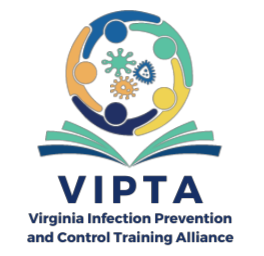
VIPTA is a statewide infection prevention and control education collaborative, led by the Virginia Healthcare-Associated Infections Advisory Group. Through partnership, VIPTA curates IPC resources for Virginia’s healthcare, congregate care, and public health settings.
Time to Fall in Love with Measles Prevention
This Valentine’s season is a good time to revisit one of infection prevention’s most reliable love stories: the partnership between measles vaccination and early public health response.
In 2025, the United States saw the highest number of measles cases in more than 30 years, with more than 2,200 people sickened and three deaths reported. After decades of progress, measles is once again reminding us why consistent prevention efforts still matter.
What to Expect:
- CDC Measles Cases and Outbreaks: Up-to-date national data on measles cases, outbreaks, and trends.
- MMR Vaccination Coverage Gaps Map: New mapping tools that show where vaccination coverage is lower and where outbreaks are more likely.
- JAMA Patient Page: What Is Measles? A clear, visual overview of measles symptoms and transmission, including images that show how measles rash can appear on different skin tones, supporting inclusive education.
- Measles Myths and Facts Factsheet: A simple, evidence-based handout that helps staff and patients separate common measles myths from facts.
How to use it:
- Build a microlearning moment.
Choose one resource per week to review briefly during staff meetings, huddles, or shift change to reinforce key prevention concepts without adding time burden. - Strengthen onboarding and refreshers.
Incorporate these resources into onboarding or annual education to reinforce measles prevention, vaccination importance, and early response expectations. - Practice vaccine conversations.
Pair the Measles Myths and Facts factsheet with role-play or discussion to help staff practice responding to common questions or misconceptions with clear, evidence-based messages.
This Valentine’s Day, fall back in love with measles prevention and the tools that help keep everyone safer.
Target Audience: Essential IPC Education Level

Guidance & Regulation Updates
VIPTA members track guidance and regulation resources to share source documents that guide infection prevention and control practices for public health staff and clinical and non-clinical healthcare personnel.
The date of the regulation or guidance update is included in each post. Please check linked content to be sure it is the most up to date and recommended practice.
CDC: Updated 2026 National Healthcare Safety Network (NHSN) Surveillance Protocols (January 2026)
APIC: New White Paper on Centralized Health-Associated Infection Surveillance Programs and Micro-Credential to Advance Centralized HAI Surveillance and Patient Safety (1/20/2026)
VDH: Clinician Letter: Respiratory Illness and Measles Updates for Virginia (1/21/2026)
AHRQ: Toolkit for Improving Skin Care and MDRO Prevention in Long-Term Care Settings
APIC: Updated Monkeypox Playbook (11/07/2025)
Effective Partnerships, Safe Communities
Old Dominion Rehabilitation and Nursing demonstrated exceptional commitment to resident and community safety during recent healthcare-associated infection and multidrug-resistant organism outbreak responses. Andrea Hart, Infection Preventionist and Sheila Clements, Director of Nursing, provided strong, effective leadership, working seamlessly with local and regional health departments to quickly address infection control gaps, implement public health guidance, and strengthen prevention practices.
Transparent communication and a collaborative mindset were key to the facility’s success, enabling timely, coordinated, and highly effective outbreak containment. This partnership also fostered lasting improvements in infection prevention that extend well beyond the immediate responses.
The VDH Eastern Region Infection Preventionist worked closely with the facility and commended its leadership for their professionalism, adaptability, and dedication to safety. Through consistent communication, on-site and remote support, and shared problem-solving, the team implemented evidence-based interventions and piloted new tools to enhance outbreak readiness.
The success of these outbreak responses underscores the power of strong partnerships between long-term care facilities and public health teams. Old Dominion Rehabilitation and Nursing’s collaborative approach exemplifies excellence in long-term care leadership and a shared commitment to protecting residents, staff, and the community.
IPC Education & Training Library
Search the VIPTA library of curated infection prevention and control (IPC) education and training resources. The IPC Education & Training Resource Library includes state and national resources related to healthcare-associated infections, antimicrobial resistance and/or IPC. Visit the VIPTA FAQ page to learn more about VIPTA library content.




